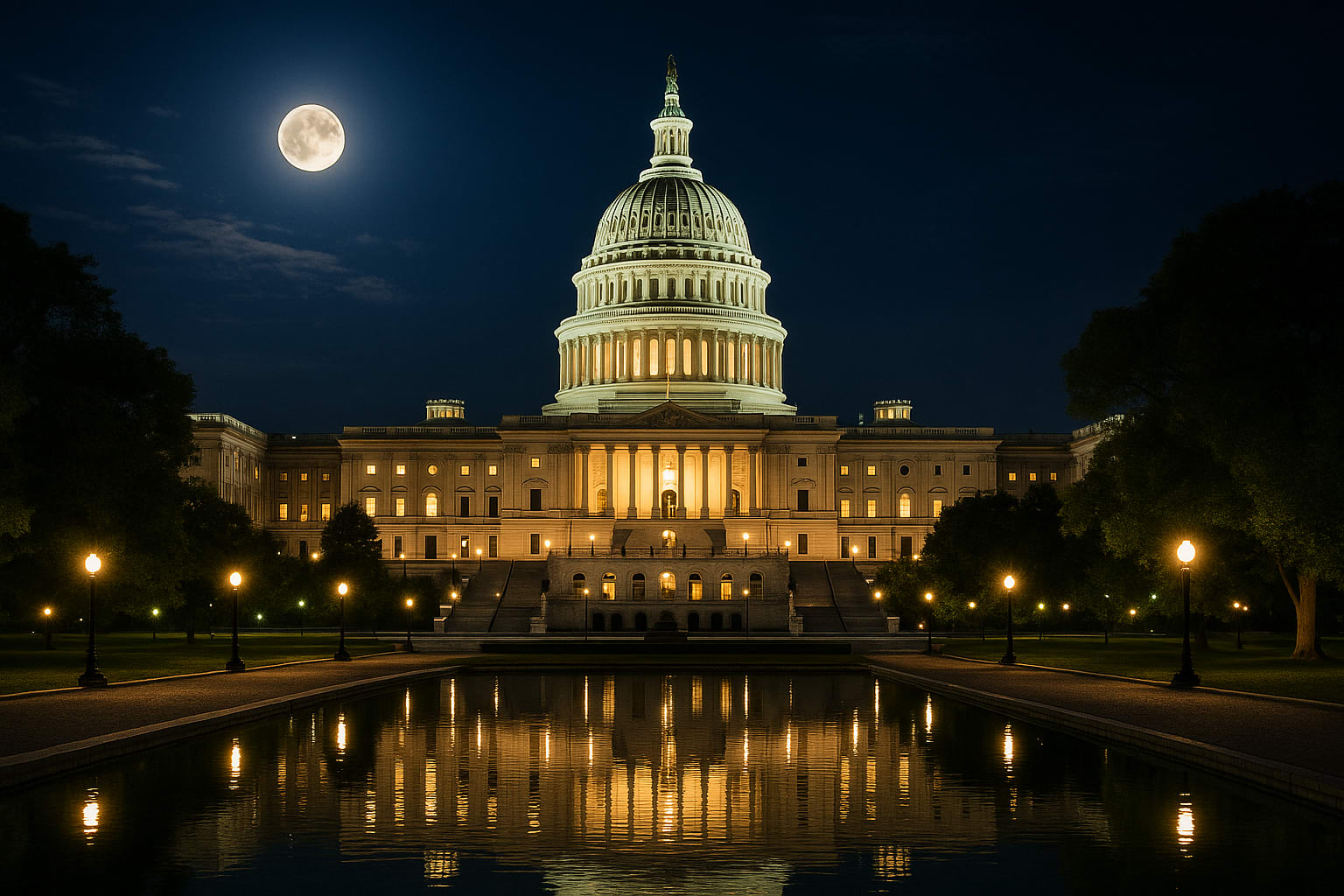The People's Haunted House
The United States Capitol Building serves as more than the seat of American democracy - it's a paranormal parliament where the nation's deceased leaders continue their service beyond the grave. Built on Jenkins Hill, once known as a 'pedestal waiting for a monument,' the Capitol has become a monument to both democracy and the supernatural. From its blood-soaked stones (it was built partially by enslaved people, some of whom died during construction) to its role in every major American crisis, the Capitol has absorbed more psychic energy than perhaps any building in America. The result is a structure where past and present collide, where dead senators still filibuster, and where the weight of history manifests as very real ghosts.
Built on Bones and Blood
The Enslaved Builders
Enslaved African Americans performed much of the Capitol's construction, with some dying from accidents, exhaustion, and abuse. Their unmarked graves likely lie beneath the building. These forgotten builders manifest as shadow figures in the basement, the sound of hammering at night, and tools that move on their own during renovations. Their spirits seem to still be building, forever construction a democracy that didn't include them.
The War Hospital
During the Civil War, the Capitol became a massive hospital and bakery for Union troops. Thousands of soldiers died in rooms now used for legislation. Their spirits remain, wandering halls in phantom uniforms, searching for medical aid that never comes. The smell of bread baking mysteriously wafts through corridors, and some hear groans of pain from empty committee rooms.
The Violent History
The Capitol has seen violence from the British burning in 1814 to various attacks and shootings. In 1954, Puerto Rican nationalists shot five congressmen. In 1856, Preston Brooks nearly beat Senator Charles Sumner to death with a cane on the Senate floor. Each violent act left psychic scars that manifest as paranormal activity.
Democracy's Eternal Representatives
The Demon Cat
The Capitol's most famous ghost isn't human - it's the Demon Cat or 'D.C.' This spectral feline appears before national tragedies. It appeared before Lincoln's assassination, the 1929 stock market crash, and 9/11. Starting as a kitten, it grows larger as it approaches, reaching the size of a tiger before vanishing. Some believe it's a cursed guardian, warning of impending doom.
John Quincy Adams
The sixth president, who died in the Capitol after a stroke on the House floor, still serves. His ghost appears in Statuary Hall (the old House chamber), eternally giving his final speech. Witnesses hear him denouncing the Mexican War, see him collapse, and watch as phantom congressmen rush to help. His spirit seems unaware he's dead, still trying to finish his last legislative act.
The Librarian Ghost
Dr. John George Stephenson, the first Librarian of Congress, haunts the Capitol's library areas. He appears as an elderly man organizing books that aren't there, shushing noises only he can hear, and helping researchers find documents - sometimes successfully. Books move on their own, and some researchers report finding exactly the document they need placed prominently on their desk.
General Logan's Restless Spirit
Civil War General John A. Logan, who later served as senator, haunts the halls where his statue stands. His ghost has been seen stepping down from his pedestal, walking the halls in full uniform, and returning to his bronze form before dawn. Security cameras have captured his statue in different positions, though it weighs tons.
The Unknown Soldier
A Union soldier who died in the Capitol when it was a hospital haunts the basement. He appears in a blood-soaked uniform, asking for water and his mother. He seems trapped in his dying moments, unaware that the war ended over 150 years ago. Night janitors leave water for him, which is sometimes found empty by morning.
Legislative Phenomena
Statuary Hall Acoustics
Statuary Hall's unique acoustics allow whispers to be heard across the room - but some whispers come from no living source. Visitors hear debates from the 1800s, arguments about slavery, and speeches from long-dead representatives. John Quincy Adams supposedly used this acoustic quirk to eavesdrop on opponents, and his ghost still listens from his death spot.
The Rotunda Manifestations
The Rotunda, where many presidents and dignitaries have lain in state, experiences regular paranormal activity. Visitors report seeing phantom funeral processions, hearing funeral dirges, and feeling the presence of great Americans paying respects to other great Americans. Lincoln's ghost frequently appears here, viewing his own catafalque.
The Basement Terrors
The Capitol basement, with its maze of tunnels and forgotten rooms, hosts the most disturbing phenomena. Staff report being chased by invisible entities, hearing chains dragging (from the building's brief time holding prisoners), and finding rooms that shouldn't exist. Some areas are so active that even seasoned security guards refuse to patrol them alone.
Touring Democracy's Haunted Halls
While public tours don't officially acknowledge ghosts, Capitol guides often share 'historical curiosities' that are clearly paranormal. They'll point out where the Demon Cat appears, where Adams died, and which statues 'seem to move.' Night staff are more forthcoming about their experiences, though they're discouraged from speaking publicly. The best paranormal activity occurs after hours when the building quiets and the dead become active. Security staff report that 3 AM is 'ghost rush hour' when multiple spirits manifest simultaneously. The basement is off-limits to tours but hosts the most intense activity. Some Congress members privately acknowledge the ghosts, even claiming that spectral predecessors have influenced their votes. One senator reported that a ghost senator from his state appeared in his office, advising him on legislation. Whether true or political theatre, such stories add to the Capitol's supernatural mystique. The Capitol's ghosts seem genuinely invested in democracy's continuation. They're not vengeful spirits but eternal public servants, still working for a country that, for many of them, no longer exists as they knew it. In the Capitol, democracy truly is eternal - because its practitioners never really leave office, even after death.

